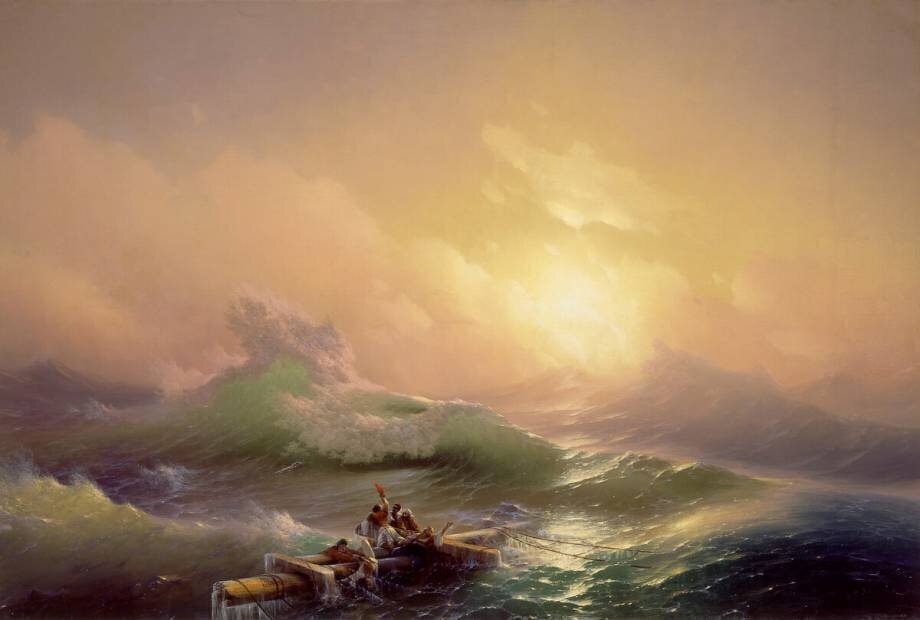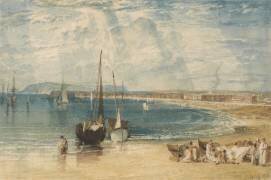Customise
Your art print
The Ninth Wave OF Ivan Aivazovsky
The Ninth Wave
The Ninth Wave: a captivating and mysterious marine work
Since the dawn of time, the ocean has held an unparalleled fascination for mankind. The Ninth Wave is a renowned work of art that has captured this fascination.
The artist behind the canvas: Ivan Aïvazovski
Ivan Aïvazovski, a 19th-century Armenian artist, is considered one of the undisputed masters of marine painting. Over the course of his career, he produced more than 6,000 paintings, many of which feature storms and shipwrecks. The Ninth Wave is probably his most famous and iconic work.
His style and influences
Having studied at the Imperial School of Fine Arts in St Petersburg, Aïvazovski was influenced by several artistic currents, such as Romanticism and Realism. He is also known to have been a fervent admirer of J.M.W. Turner, another great British maritime painter.
His innovative technique
Aevazovsky had an innovative approach to painting. He used a combination of oil and watercolour techniques to create surprising light effects. His mastery of chiaroscuro gave rise to works of impressive intensity and realism.
The Ninth Wave: a spellbinding scene
Painted in 1850, The Ninth Wave is a perfect reflection of Aïvazovski's talent for depicting the forces of nature. The painting depicts a group of shipwrecked men clinging to a wreck in the middle of a storm. The artist has brilliantly recreated the dramatic and distressing atmosphere of this chaotic scene.
The central element: the raging sea
At the heart of this composition is the sea, whose power is beautifully rendered by the tumultuous waves and dark colours. Light also plays an essential role in the work, creating a striking contrast between the lit and shaded areas. The result is a striking illustration of the violence and unpredictability of the ocean.
The castaways: symbols of hope and despair
The characters on the canvas bear witness to human distress in the face of the raging elements. Some seem resigned, while others fight desperately for survival. This group of castaways embodies both human vulnerability and perseverance in the face of nature's infinite power.
The symbolism of the ninth wave
The Ninth Wave is a work imbued with mystery and spirituality. Several interpretations have been proposed over the years in an attempt to unravel the hidden meaning of this spellbinding scene.
The myth of the ninth wave
Legend has it that the ninth wave is the most powerful and destructive of all. This belief, stemming from maritime tradition, is said to have inspired Aïvazovski to create his painting. The painting can thus be seen as a representation of the immutable cycle of destruction and renewal that characterises nature.
An allegory of the human condition
The Ninth Wave can also be interpreted as a metaphor for the eternal struggle between man and the unknown forces that govern his destiny. The castaways would then symbolise human souls facing the storms of life, desperately seeking refuge in a world in chaos.
A masterpiece that continues to fascinate
Today, The Ninth Wave remains an inexhaustible source of inspiration for art lovers and lovers of the sea. This timeless work is a poignant testament to Ivan Aïvazovski's genius and his ability to capture the very essence of natural elements.
This artwork is a painting from the classical period. It belongs to the romanticism style.
« The Ninth Wave » is kept at State Russian Museum, St. Petersburg, Russia.
Find the full description of The Ninth Wave by Ivan Aivazovsky on Wikipedia.



































